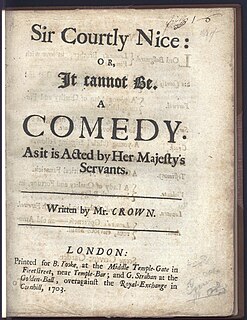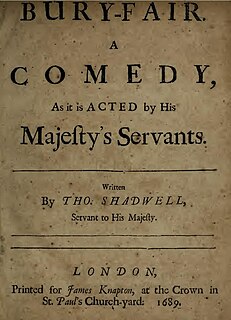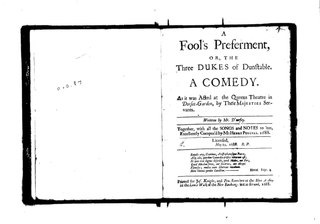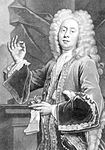Related Research Articles
Henry The Second, King Of England; With The Death Of Rosamond is a 1692 historical play often attributed to William Mountfort but possibly written by John Bancroft. It was first staged at the Theatre Royal, Drury Lane by the United Company. The prologue and epilogue were written by John Dryden. Some incidental music was composed by Henry Purcell.

The Squire of Alsatia is a 1688 comedy play by the English writer Thomas Shadwell. Alsatia was a nickname for the Whitefriars area of London, deriving from Alsace in northeastern France. A restoration comedy, it was performed at the Drury Lane Theatre by the United Company following on from John Crowne's Darius, King of Persia. One of the best-remembered roles, that of the shrewish Mrs. Termagant was first performed by Elizabeth Boutell. It was revived numerous times during the eighteenth century.
The Biter is a 1704 play by the English writer Nicholas Rowe. Rowe was better known for his tragedies but chose to try his hand at comedy. Performed at the Lincoln's Inn Fields Theatre, it was not a great success and lasted for about six performances. It was overshadowed by the more popular The Careless Husband by Colley Cibber, which appeared at the Drury Lane Theatre. It was Rowe's only play in a contemporary setting, and he rapidly turned back to historical tragedies beginning with Ulysses (1705). Some sources reported Rowe defiantly and loudly laughing at the jokes during a performance, even while nobody else did.

Greenwich Park is a 1691 comedy play by the English writer William Mountfort.
The Successful Strangers is a 1690 tragicomedy by the English writer William Mountfort.
Regulus is a 1692 tragedy by the English writer John Crowne. It portrays the career of Marcus Atilius Regulus, a Roman Consul at the time of the First Punic War. A separate play of the same title was written by William Havard in 1744.

Sir Courtly Nice: Or, It Cannot Be is a 1685 comedy play by the English writer John Crowne. Rehearsals by the United Company were underway when the death of Charles II in February led to the closure of all theatres as a mark of respect. The play was eventually staged on 9 May at the Theatre Royal, Drury Lane. It is the tradition of the Restoration Comedy. A popular hit it became a stock part of the repertoire for more than a century, with Colley Cibber and Anne Oldfield appearing in a celebrated 1709 revival.

Dame Dobson is a 1683 comedy play by the English writer Edward Ravenscroft.
The Marriage-Hater Matched is a comedy play by the English writer Thomas D'Urfey. It was first staged by the United Company at the Theatre Royal, Drury Lane in January 1692. The original cast included John Bowman as Brainless, William Mountfort as Sir Philip Freewit, Samuel Sandford as Limber, John Hodgson as Darewell, Anthony Leigh as Myn Here Van Grin, George Bright as Bias, Thomas Doggett as Solon, William Bowen as Callow, Colley Cibber as Splutter, Elizabeth Barry as Lady Subtle, Katherine Corey as Lady Bumfiddle, Anne Bracegirdle as Phoebe, Charlotte Butler as La Pupsey and Abigail Lawson as Margery.
Love For Money; Or, The Boarding School is a 1691 comedy play by the English writer Thomas D'Urfey. It was originally staged at the Theatre Royal, Drury Lane by the United Company. In 1733 it was adapted into a ballad opera The Boarding School by Charles Coffey.

Don Sebastian, King Of Portugal is a 1689 tragedy by the English writer John Dryden. It is based on the reign of Sebastian of Portugal leading up to his defeat and death at the Battle of Alcácer Quibir in 1578. An Elizabethan play The Battle of Alcazar also portrays the events.

The Wives Excuse also The Wives Excuse; Or, Cuckolds Make Themselves is a 1691 comedy play by the Anglo-Irish writer Thomas Southerne. The title is sometimes written more grammatically as The Wives' Excuse.
John Hodgson was an English stage actor of the late seventeenth century. He joined the United Company in 1688 and his first recorded appearance was in The Treacherous Brothers at Drury Lane in 1690. In 1695 he was one of several actors who broke away to join Thomas Betterton's new company at Lincoln's Inn Fields. His name is sometimes written as Hudson. He was married to the singer Mary Hodgson.
The Maid's Last Prayer: Or, Any Rather Than Fail is a 1693 comedy play by the Irish writer Thomas Southerne. It was first staged at the Theatre Royal, Drury Lane by the United Company.

The Fortune Hunters; Or, Two Fools Well Met is 1689 comedy play by James Carlile. It was originally staged by the United Company at the Theatre Royal, Drury Lane in London.

Bury Fair is a 1689 comedy play by the English writer Thomas Shadwell. It is part of the tradition of Restoration Comedy that flourished during the era. It was first staged by the United Company at the Theatre Royal, Drury Lane in London.

Love Triumphant; Or, Nature Will Prevail is a 1694 tragicomedy by the English writer John Dryden. It was Dryden's final stage play.

A Fool's Preferment; Or, The Three Dukes Of Dunstable is a 1688 comedy play by the English writer Thomas D'Urfey. It is a reworking of John Fletcher's Jacobean work The Noble Gentleman. It was first performed by the United Company at the Dorset Garden Theatre in London. Henry Purcell composed the play's incidental music. It was his first major work composingfor the theatre in seven years since Sir Barnaby Whigg.
Distress'd Innocence; Or, The Princess Of Persia is a 1690 tragedy by the English writer Elkanah Settle. It was first performed by the United Company at the Theatre Royal, Drury Lane in London. Incidental music was composed for the play by Henry Purcell.
King Edward The Third; With The Fall Of Mortimer, Earl Of March is a 1690 tragedy, generally attributed to the English writers John Bancroft and William Mountfort. It was first performed by the United Company at the Theatre Royal, Drury Lane in London. It portrays the early years of the reign of Edward III and his defeat and execution of Roger Mortimer, Earl of March.
References
- ↑ Van Lennep p.388
